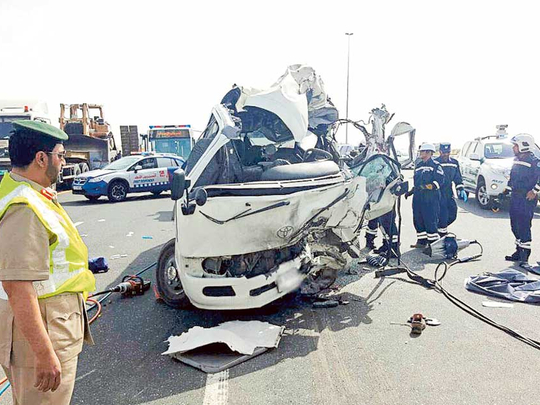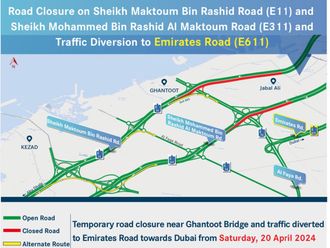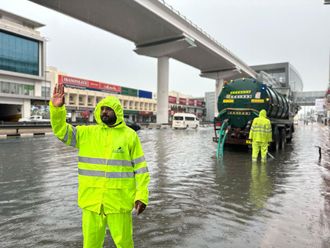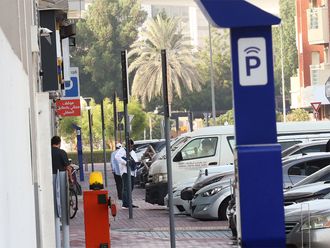
Dubai: Road safety experts in the UAE have called on commercial fleet owners to educate drivers on safe driving measures, following the horrific accident on Emirates Road on Tuesday that killed seven.
The accident took place early on Tuesday when a bus carrying senior employees of Assent - Al Shafar Steel Engineering ploughed into a 70-tonne truck that had stopped in an undesignated area on Emirates Road in the direction of Abu Dhabi, behind Al Maktoum International Airport.
A total of 13 people were injured in the accident, four of whom are currently receiving treatment at Rashid Hospital.
Speaking to Gulf News about the “unacceptable practice of stopping in the middle of the road”, Thomas Edelman, CEO of RoadSafetyUAE, said: “Stopping in undesignated areas must stop, especially after minor accidents. Motorists must move their vehicles out of the way of oncoming traffic and on to the hard shoulder and erect proper warning signs [warning triangle] to warn oncoming traffic.”
Urging authorities to clearly communicate the importance of moving out of live traffic, he added: “The owners and fleet operators of commercial vehicles and fleets must inform and educate their drivers about the right practices. This is not the first big accident where trucks or commercial vehicles stop in undesignated areas causing fatalities on our roads.”
While stringently enforcing the laws on the part of authorities is required, he highlighted the importance of continuous education of fleet operators and owners of buses and minibuses to make their drivers aware of the laws and to most diligently make sure that their drivers are alert at all times. “They carry the responsibility for their passengers. It’s heartbreaking to witness accidents like this, where many innocent passengers get to pay the ultimate price for the neglect of others,” said Edelman.
He urged drivers, especially commercial drivers, to be extra alert.
“Distractions must be avoided, like mobile phone use, but in the context of buses and minibuses also the distraction of drivers by passengers must be avoided,” he added.
Most highways in the UAE have sufficient space on hard shoulders for an emergency stop. Gulf News visited the accident site on Wednesday and found that there was enough space on either side of the road for the truck to stop.
Dr Britta Lang, country director of Transport Research Laboratory UAE, said that the one way that similar collisions could be avoided is by improving drivers’ awareness of safe procedures in case of emergencies.
“Stopping on a live lane on a high speed road after a minor accident is very unsafe as other drivers may not notice stationary vehicles quickly enough to safely change lanes,” said Dr Lang.
She added: “As with a number of road safety issues, the solution often lies in a combination of education, engineering and enforcement measures. One immediate action that could be taken is a campaign to increase drivers’ awareness of the safe and correct actions following a collision.”
She said that Dubai has achieved significant reductions in collision rates despite the increasing population and vehicle numbers. But in order to sustain this success, it is crucial that safety efforts are coordinated and continued through a combination of education, engineering and enforcement.
UAE has introduced several safety initiatives, including speed limiters for buses with a capacity of 22 seats or more.
The latest reported figure of 6.52 fatalities per 100,000 indicates that the road safety in the country is improving but, according to Dubai Police, there has been an increase in the number of fatal accidents in Dubai, with 59 reported in the second quarter of this year compared with 42 in the corresponding period of 2015.
Emirates Road has been listed as the second most dangerous road in Dubai witnessing fatal accidents. There were nine accidents involving deaths on Emirates Road in the second quarter of 2016 compared to none last year.












